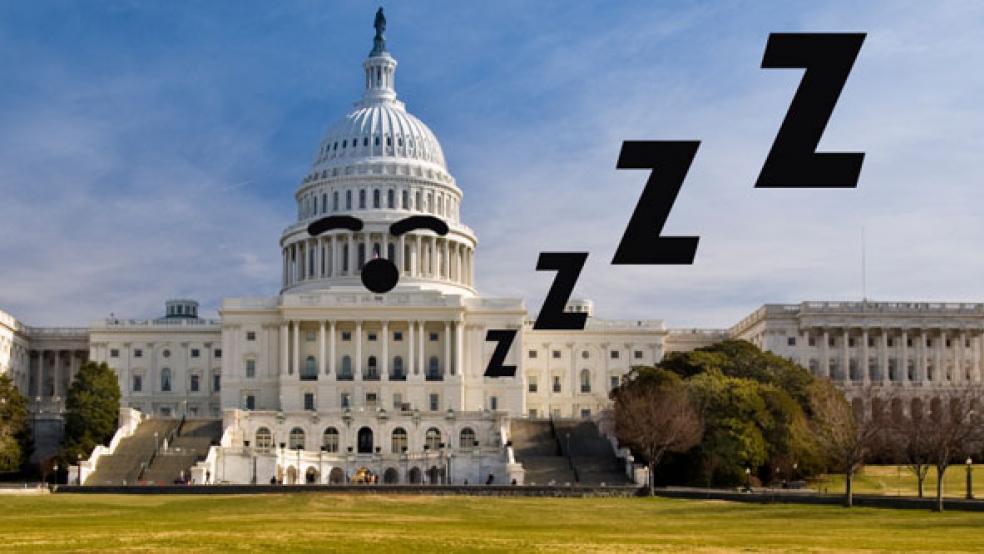If the 113th Congress broke all records last year for being the biggest do-nothing legislative body in modern times, this year it may set the record for doing “next to nothing.”
Big-ticket measures such as comprehensive immigration reform, an overhaul of the tax code, an increase in the minimum wage, an extension of long-term unemployment insurance, improvements to the Affordable Care Act, major infrastructure projects for creating new jobs, expedited trade legislation and more appear well out of reach, according to some political experts.
Related: How the 113th Do-Nothing Congress Lived Up to Its Name
With a new two-year budget and spending package in place and a year-long extension of the Treasury’s borrowing authority agreed to, Republicans have signaled an unwillingness to take up any politically-charged measure this year that might detract from their efforts this fall to expand their majority in the House and possibly take back control of the Senate.
Instead, they will pursue a series of safe, small-bore and feel-good measures that can in no way jeopardize their mid-term election campaign strategy.
“It’s going to be all finger food and no main course,” Ross Baker, a political science professor at Rutgers University and an expert on Congress, said on Wednesday. “We’re seeing a new, hibernating Congress. It sounds like they’re going into their dens for the winter. It’s really kind of interesting, because I think from the point of view of the Republicans in the House, their approach is to ‘do no harm,’ which of course is hardly a rallying cry.”
For sure, the 113th Congress would have to make a real effort to match last year’s dismal performance when it was arguably one of the least productive bodies in history. Lawmakers passed just 55 substantive bills that were signed into law, according to the Pew Research Center, while getting bogged down in a partisan morass over scores of other important matters.
The ‘New and Improved’ Ted Cruz Infuriates His Colleagues Again
The Washington Post reported this week that after a tumultuous week of party infighting and leadership stumbles, “congressional Republicans are focused on calming their divided ranks in the months ahead, mostly by touting proposals that have wide backing within the GOP and shelving any big ticket legislation for the rest of the year.”
In that vein, The Post said, championing a handful of bills on job growth, energy and regulatory policy – “all targeted at courting swing voters but unlikely to win Democratic support – has become a priority.”
House Majority Leader Eric Cantor (R-VA) set the tone for the new “do-next-to-nothing” approach with an article published last week by National Review Online that is high on generalities and short of specifics. Cantor lamented what he described as “the middle-class squeeze” – the combination of a median household income lower today than it was in 2000, a long-term flat-lining of wages, and growing household costs for gasoline, health care, utilities and education.
“Our agenda for an America that works will go beyond support for small-business owners and capital formation; our platform will address the concerns of the 90 percent of Americans who don’t own a business and are looking for a good-paying job to support their families,” he wrote. “We will pursue policies that support them as they seek a secure job with a decent salary that enables them to support their families, pursue their dreams, and leave their children a little more than they have.”
Related: Cantor, Ryan, Rubio, Rush--Who Speaks for the GOP?
His ideas for tackling this squeeze? Reduce household energy and health-care costs, stop regulations that reduce take-home pay, and update the tax code. “We will confront head-on the policies of the Obama administration that punish work, such as the 29-hour-work-week provision in Obamacare that is cutting hourly workers’ wages by as much 25 percent,” Cantor declared.
For their part, the Democrats aren’t promising all that much more either. During his State of the Union speech last month, President Obama declared 2014 a year of action. He said that would include new immigration laws and retirement savings, reducing the economic inequality gap and creating a pathway for cheaper college education.
Apart from his big push for raising the minimum wage – a proposal unlikely to get past the House this year – much of what he vowed to do entailed the use of executive orders to bypass the Congress.
Related: Tax Breaks 2014: A $63 Billion Boon to Business
Congress approved new farm and food stamp legislation shortly after returning to work, which may turn out to be one of its biggest accomplishments of the year. Senate Majority Leader Harry Reid (D-NV) vowed early on to push through an extension of unemployment insurance for 1.7 million long-term unemployed people, but so far hasn’t been unable to overcome Republican opposition.
What’s more, Reid and other top Democrats are vigorously opposing a major element of Obama’s economic strategy – to use fast-track authority to negotiate the two largest trade deals in U.S. history, in the Pacific Rim and European Union. Obama hasn’t given up hope that he can prevail in that battle, but for now it’s not looking good for the president.
“I think the Democrats, by necessity because they are the party of the president, will have to do something,” Baker said. “They can’t rely on the president to be the only source of activity by issuing executive orders. I think they are going to push very hard on increasing the minimum wage. I think that’s going to be their main draw card.”
Top Reads from The Fiscal Times:
- Obama’s Workforce: Discouraged, Disincentivized, Downsized
- Another Democrat Prays that Hillary Won’t Run
- Get Ready for One-Party Rule If GOP Wins the Senate


